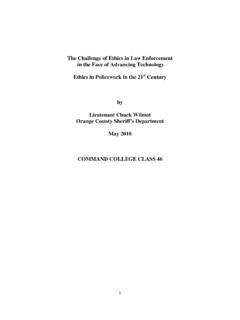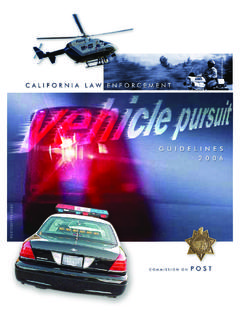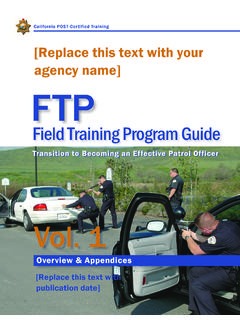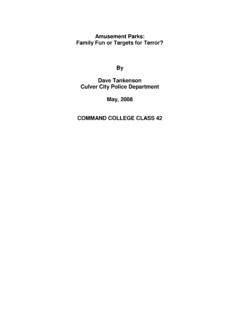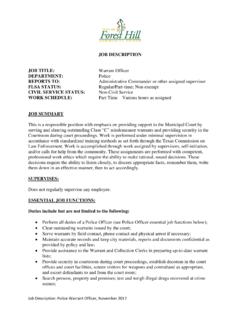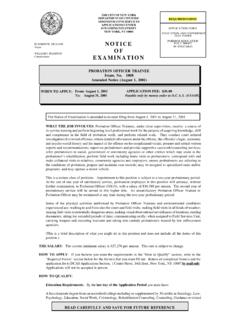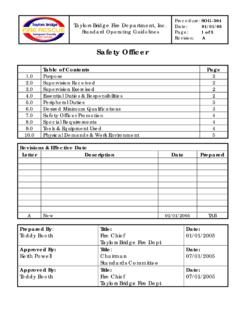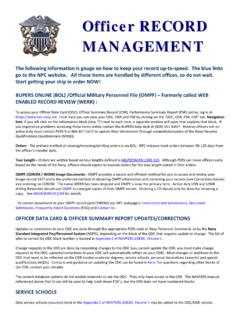Transcription of SUPERVISOR DEVELOPMENT PROGRAM AND GUIDE
1 SUPERVISOR DEVELOPMENT . PROGRAM AND GUIDE . 1996. THE COMMISSION. ON PEACE officer STANDARDS AND TRAINING. STATE OF CALIFORNIA. SUPERVISOR DEVELOPMENT . PROGRAM AND GUIDE . 1996. CALIFORNIA COMMISSION ON PEACE officer STANDARDS AND TRAINING. Copyright California Commission on Peace officer Standards and Training 1996. Published 1996. Reprinted December 1996. For more information about copies of this publication contact: POST Media Distribution Center 1601 Alhambra Boulevard Sacramento, CA 95816. (916) 227-4856. COMMISSIONERS. Manuel E. Ortega Chief of Police Chairman Placentia Police Department Jody Hall-Esser Chief Administrative officer Vice-Chair City of Culver City David C. Anderson Sergeant Los Angeles County Sheriffs Department Sherman Block Sheriff Los Angeles County Sheriffs Department Collene Campbell Public Member Michael T.
2 Cane Investigator Orange County District Attorney's Office Ted Hunt Director Los Angeles Police Protective League William B. Kolender Sheriff San Diego County Sheriffs Department Ronald Lowenberg Chief of Police Huntington Beach Police Department Daniel Lungren Attorney General Devallis Rutledge Deputy District Attorney Orange County District Attorney's Office Rick TerBorch Chief of Police Arroyo Grande Police Department Norman C. Boehm Executive Director PREFACE. One of the most difficult transitions in any organization is the promotion from line to supervisory duties. Not only are there new job tasks and responsibilities, it is perhaps the first time a new SUPERVISOR is held accountable for the actions of subordinates. The need for immediate training and guidance upon promotion or transfer is critical to facilitate the transition and enhance individual and organizational effectiveness.
3 The SUPERVISOR DEVELOPMENT PROGRAM is to be used by trainers of newly promoted or reassigned supervisors. The PROGRAM will GUIDE the trainer and student SUPERVISOR through an on-the-job training experience in the skills, knowledge and attitudes required of supervisors performing specific assignments. Formal training beyond attendance at the POST Supervisory Course is highly desirable to further develop and refine the abilities of supervisors. The intent of this PROGRAM is to provide the necessary structure to reinforce the basic principles of supervision and abilities needed to perform various supervisory assignments. The SUPERVISOR DEVELOPMENT PROGRAM emphasizes task orientation, individual training needs assessment, availability of a experienced trainer, and documentation of training progress. POST gratefully acknowledges the fine work of the SUPERVISOR DEVELOPMENT PROGRAM Committee.
4 Their dedication and tenacity provided the energy necessary to bring this PROGRAM to reality. Their efforts will reap long-term benefits for California law enforcement. NORMAN C. BOEHM. Executive Director ii ACKNOWLEDGEMENTS. SUPERVISOR DEVELOPMENT PROGRAM Committee Project Coordinator: Sam Allevato Tom Hood Lieutenant Senior Consultant Irvine Police Department Center for Leadership DEVELOPMENT Commission on POST. Ron Gilbert Deputy Sheriff Los Angeles County Sheriffs Department George Godwin Lieutenant Los Angeles Police Department David Lein Sergeant Orange County Sheriffs Department Herbert Pawlik Staff Specialist Orange County Sheriffs Department Don Robbins Sergeant San Diego County Sheriffs Department Jacqueline Seabrooks Sergeant Santa Monica Police Department Ann Staddan Training Specialist San Bernardino County Sheriffs Department Charles Walters Lieutenant Orange County Sheriffs Department iii TABLE OF CONTENTS.
5 SUPERVISOR DEVELOPMENT PROGRAM POST Commissioners Preface ii Acknowledgements iii PROGRAM Overview 1. Implementation Checklist 2. Introduction 3. The Role of the Trainer 6. The Selection and Training of the Trainer 7. Responsibilities of the Trainer 9. Selection and Responsibilities of the PROGRAM Coordinator 10. Responsibilities of Other PROGRAM Personnel 12. Implementation Issues 13. SUPERVISOR DEVELOPMENT GUIDE General Supervision GEN- 1. Patrol Supervision PAT-1. Custodial Supervision CUST-1. Traffic Supervision TRAF- 1. Investigative Supervision INV- 1. Records Supervision REC- 1. Dispatch Supervision DI SP- 1. Appendices A - Sample Mission Statement A-1. B - Documentation Process B-1. PROGRAM OVERVIEW. POST regulations require newly promoted supervisors to attend the POST Supervisory Course within one year of appointment. The SUPERVISOR DEVELOPMENT PROGRAM (SDP) is designed to address the training needs of newly promoted supervisors either before or after attendance at the POST Supervisory Course.
6 Ideally, new supervisors should be assigned to the SDP as soon after promotion as possible. The PROGRAM also meets the needs of tenured supervisors who are transferred into specific job assignments where they have little or no experience. While stressing training, the PROGRAM provides sample evaluative forms. If desirable, these progress reports provide the PROGRAM coordinator and the agency management team with the information they need to properly evaluate the student SUPERVISOR in the first critical months in their new job assignment. The SUPERVISOR DEVELOPMENT GUIDE document is generic. Each agency is encouraged to modify it to meet their individual needs. As with any other PROGRAM implementation effort, the SUPERVISOR DEVELOPMENT PROGRAM should be endorsed by the agency head reflecting a commitment to quality supervisory training.
7 In addition, PROGRAM policies and procedures should be reinforced by management and supervisory personnel on a regular basis. In this way, confusion or conflicts can be kept to a minimum. The overall intent of the PROGRAM is to provide supervisors with a structured orientation to their new job tasks and responsibilities. In-depth information on any implementation, administrative or operational issue can be found in the Supervisory DEVELOPMENT PROGRAM document. The attached checklist may help to facilitate implementation. 1. PROGRAM IMPLEMENTATION CHECKLIST. Establish policies and procedures for administration of the SDP. a Will the SDP be mandatory or voluntary? * Newly promoted supervisors 8 Supervisors transferred to new job assignments . Record keeping protocols rn Periodic evaluation forms s Completed SUPERVISOR DEVELOPMENT GUIDE e Other documentation related to student SUPERVISOR performance Select SDP Coordinator.
8 Establish criteria and process Select SDP Trainers m Establish criteria and process 8 Determine training needs for trainers Operational Issues 63 Time parameters for completion of the SDP. 0 Contingency plans if student SUPERVISOR experiences difficulty or is unable to complete the SDP. m Process for addressing conflicts between trainer, student SUPERVISOR , andfor "natural" boss INTRODUCTION. The responsibilities that newly promoted or reassigned supervisors face are complex and challenging. Now, more than ever, the need for positive leadership by first-line supervisors is absolutely essential. The state-wide lack of consistent field orientation and training for new supervisors has lead to the creation of the SUPERVISOR DEVELOPMENT PROGRAM model. The SUPERVISOR DEVELOPMENT PROGRAM is the deliberate pairing of a more skilled or experienced person (trainer) with a lesser skilled or experienced one (student SUPERVISOR ), with the agreed upon goal of having the student SUPERVISOR grow and develop specific competencies under the guidance of the trainer.
9 Although supervisors are fully trained officers, they, in many instances, lack hands-on supervisory experience. The SUPERVISOR DEVELOPMENT PROGRAM is designed to provide an orderly transition from line officer to first-line SUPERVISOR . It also provides support and orientation for supervisors reassigned to a new job. It is the intent of this PROGRAM to provide a clear definition of the role of the first line- SUPERVISOR , stressing orientation and training goals. Emphasis is placed on training and not on evaluation. In order to gain maximum benefit from the SUPERVISOR DEVELOPMENT PROGRAM , it should be offered as soon as possible after assuming the new job. In 1991, POST conducted the first Symposium on Training Issues. Stakeholders from all areas of the criminal justice community participated and provided POST with over 90 training recommendations.
10 One in particular addressed the training needs of new supervisors. In part, the recommendation states: "Consider mandating training prior to assuming field responsibilities - newly promoted supervisors should receive minimal training prior to assuming any field ". Ideally, the student SUPERVISOR should attend the POST Supervisory Course prior to commencing actual supervisory duties. In many cases, this is not feasible. The SUPERVISOR DEVELOPMENT PROGRAM is designed to complement this formal supervisory training. Whether implemented before or after formal classroom training, this PROGRAM creates a positive environment to facilitate the student SUPERVISOR 's transition. Benefits of the SUPERVISOR DEVELOPMENT PROGRAM include: + Formal training for student SUPERVISOR , possibly reducing liability exposure An opportunity to reinforce agency policies, procedures and values 0 Instill and/or reinforce the concepts of supervisory responsibility and accountability + Monitoring of the student SUPERVISOR 's transition + Familiarizing experienced supervisors who have been assigned to a new job + Practical application of newly learned job skills (on-the-job training of Supervisory Course, formal training, etc.)

